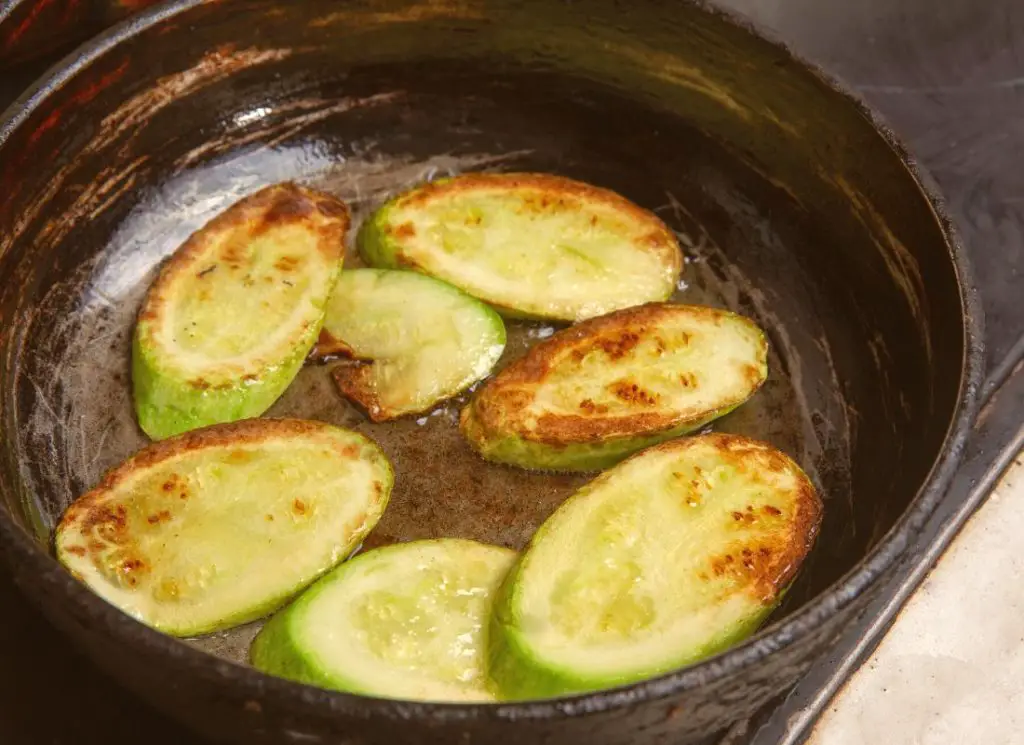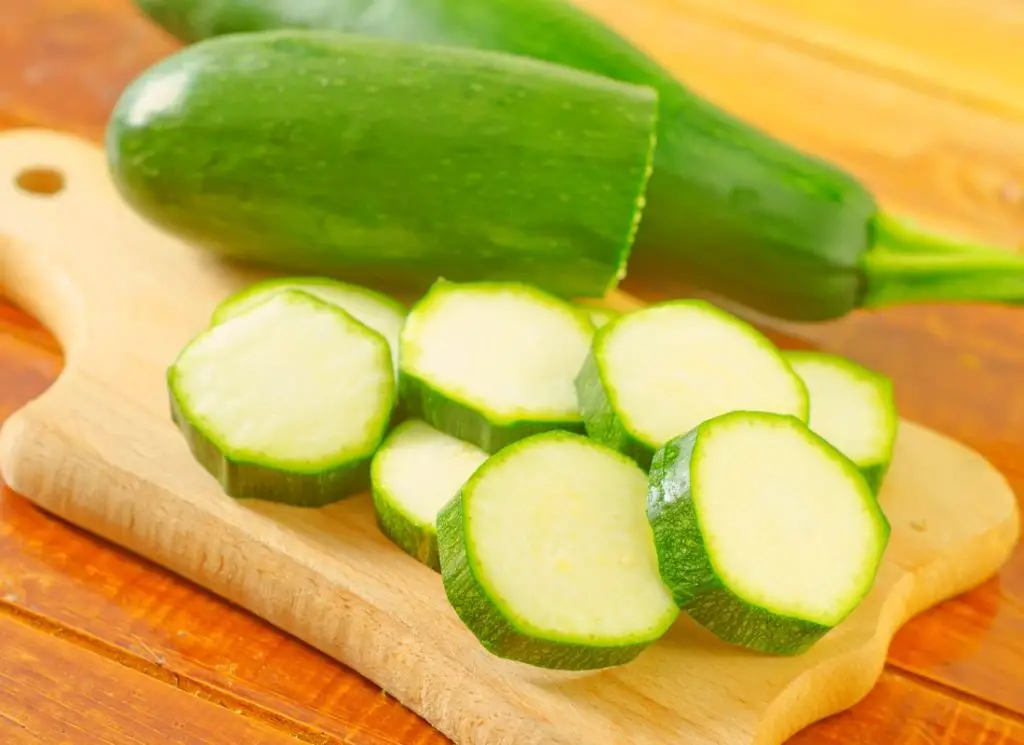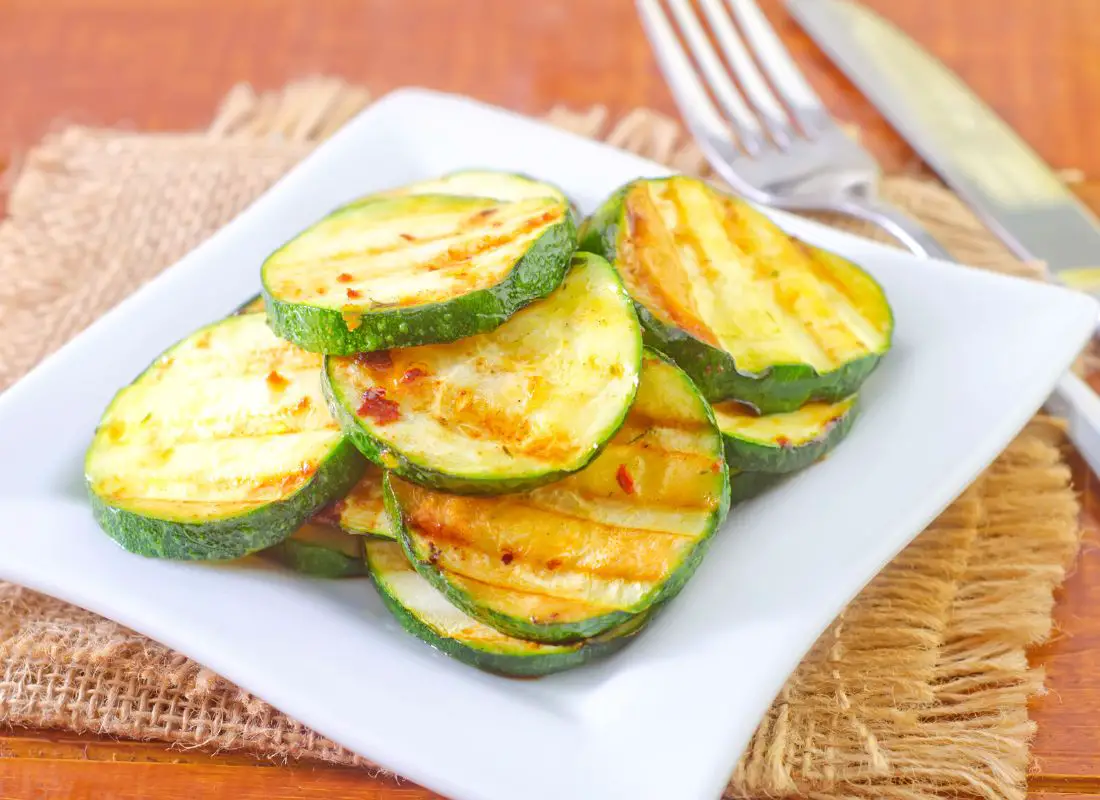Is zucchini low histamine? If you suffer with histamine intolerance, what you eat matters. By avoiding food triggers, you can minimize your symptoms and enjoy meals without experiencing symptoms afterward.
In simple terms, zucchini is low histamine, meaning that, for most people, eating zucchini won’t increase their body’s histamine level or worsen histamine intolerance symptoms.
But before adding zucchini to your shopping cart, let’s dig a little deeper. Zucchini contains some components that could be problematic for some people with histamine intolerance and those with other food sensitivities.
But first, let’s clarify what histamine is and what role it plays in histamine intolerance symptoms.
The Role of Histamine in Histamine Intolerance Symptoms
You know that itchy, uncomfortable feeling when you have an allergic reaction? That’s due to histamine, a chemical your body makes naturally in response to certain triggers, like allergens. Histamine gets the blame for symptoms like hives or headaches, but it also plays other important roles in your body.
Histamine aids in healthy digestion by helping with stomach acid production. It also contributes to the body’s inflammatory response, and functions as a neurotransmitter in the brain.
So it’s a tricky balance – you need some histamine, but too much becomes a problem. Some people have a condition called histamine intolerance where they lack or have low quantities of the necessary enzymes, like diamine oxidase, to break histamine down effectively.
When you can’t break down histamine efficiently, even normal amounts from food or environment can overwhelm your system enough to trigger symptoms. Suddenly histamines become the uninvited guest that stays too long at the party, causing all kinds of uncomfortable issues for their hosts!
While not an allergy per se, excess histamine can trigger allergy-like symptoms. Thankfully there are ways to get this party crasher under control. As nutritionists will tell you, avoiding high-histamine foods is the most effective approach. Some people also take supplements to boost the enzyme diamine oxidase (DAO) that helps clear histamine from your body.
Getting your histamine levels balanced can help you get back to feeling your best. So in a nutshell, histamine is crucial for our bodies, but too much causes problems. Keeping the right balance is key for health and happiness!
The Role a Low-Histamine Diet Plays in Managing Histamine Intolerance Symptoms
As mentioned, transitioning to a low-histamine diet can help with the management of histamine intolerance. You’ll want to focus on fresh, whole foods and avoid aged, fermented or smoked foods since those tend to be high in histamines. It also requires education and awareness, as even some fresh foods can elevate your histamine level.
I know changing your diet takes some adjustment, but with a little planning it can make a big difference. Read labels carefully – even things like citric acid can trigger symptoms for some folks. Working with your doctor and nutritionist on an elimination diet could help identify your personal triggers too.
While it’s challenging at first, many find the effort worth it for the symptom relief. The goal here is to control these frustrating symptoms and help you feel better day-to-day. Now let’s take a closer look at whether there are histamine in zucchini and whether it’s a smart choice on a low-histamine diet.
Zucchini Is a Nutrient-Dense Vegetable
Zucchini is a popular vegetable in Mediterranean cuisine, one of the healthiest and most versatile diets in the world. People add it raw to salads or saute it as a side dish.
The reality is there are many ways to enjoy zucchini, either raw or cooked. A side dish of sauteed zucchini, for example, is a healthier substitute for potatoes. Zucchini also has less impact on blood sugar than potatoes, making it a smart choice if you have type 2 diabetes or prediabetes.
As nutritionists point out, enjoying a side dish of zucchini is better for your metabolic health than eating a plate of potatoes. Plus, zucchini is more nutritious.
Plus, zucchini is a good source of vitamin A, vitamin C, vitamin B6, thiamine, potassium, and magnesium, and is low in carbohydrates, fat, and calories. (6) It contains natural carotenoids like zeaxanthin and lutein that are beneficial for eye health. (7)
Studies show these nutrients may lower the risk of age-related macular degeneration; a common cause of visual decline related to aging.
Find out whether it’s safe to put tomato sauce in zucchini if you have histamine intolerance.
Zucchini and Histamine Intolerance: Other Amines and Components in Zucchini May Be a Problem
If you have histamine intolerance, you know that foods that trigger histamine release can worsen histamine intolerance symptoms. Since zucchini is not naturally high in histamine, it should not increase your body’s histamine load.
Also reassuring is the lack of evidence that zucchini affects diamine oxidase, the main enzyme that breaks down histamine. Nor is it known to be a histamine liberator, a food that triggers histamine-producing mast cells to release histamine .
But here’s why you still should be cautious about zucchini, until you know how your body responds to it. When you have histamine intolerance, other amines, other than histamine, may trigger histamine intolerance symptoms too.
According to a chemical chart put out by the Royal Prince Alfred Hospital’s Allergy Unit, or RHPAH, in Australia, zucchini is a food that contains amines, salicylate, and glutamate. (2) The data comes from lab testing carried out by the allergy unit, and their experience working with clients.
Some people with histamine intolerance are also sensitive to glutamate and salicylates in food and should avoid eating foods high in these amines. (9)
Zucchini Allergies Occur Too
Therefore, reconsider eating zucchini if you have sensitivities to these chemical components in food. Plus, scientists have discovered key proteins in zucchini that trigger allergic reactions in some people.
The proteins they identified are also in celery and birch pollen. People with allergies to birch pollen may also experience allergic reactions to zucchini and celery due to cross-reactivity. (1,4)

Most people don’t think of vegetables, like celery and zucchini, as foods that people are commonly allergic to, but zucchini and celery allergies do occur. However, they don’t top the list of foods people are allergic to.
However, if you have histamine intolerance but don’t have allergies to these foods and aren’t sensitive to salicylates and glutamate, you can usually tolerate zucchini. But as with any new food you add to your diet, monitor how your body responds to it by keeping a food diary.
Zucchini, Histamine, and Oral Allergy Syndrome
Although allergies to zucchini aren’t very widespread, localized reactions to it are. Some people have a condition called oral allergy syndrome, a localized form of allergic reaction that affects the lips, mouth, and throat.
People with oral allergy syndrome react to the proteins in a variety of fruits and vegetables. When they eat them, they experience itching and swelling around your mouth, lips, tongue, and throat.
Some people also experience oral allergy symptoms when they eat zucchini. Oral allergy stimulates a local release of histamine but doesn’t usually cause systemic allergy symptoms. However, in rare cases, it can cause life-threatening swelling of the throat. (3,5)
Oral allergy syndrome is more common in people with seasonal allergies. Cooking or peeling zucchini and other fruits and vegetables may reduce the risk of localized allergic reactions from oral allergy syndrome.

Histamine Content of Zucchini
Is zucchini low histamine? Zucchini is not naturally high in histamine, but it may contain other amines, as components like glutamate and salicylates, that can cause reactions in some people.
If you’re sensitive to any of these components in food, be cautious about eating zucchini. Introduce small quantities into your diet. Keep a food journal and document any symptoms you experience when you eat zucchini. Also, avoid refrigerating leftover zucchini for more than a day or two.
When you store leftovers, you run the risk of histamine build-up, as the food matures and histamine-producing bacteria become more abundant. Find out more about whether leftover vegetables are safe to eat.
By now, you’re probably familiar with the symptoms of histamine intolerance and the effect histamine release has on your body. Histamine intolerance symptoms vary with the individual. Some you should be aware of:
- Digestive issues
- Hives or rash
- Headache
- Stuffy or runny nose
- Nausea or abdominal pain
- Dizziness or lightheadedness
- Fatigue
- Changes in blood pressure
- Heart palpitations
- Anxiety
If you experience these symptoms, note the food that triggered it, and avoid it in the future.
Although most people with histamine intolerance can safely eat zucchini, a small number cannot and should avoid it. This is because they’re sensitive to other components in this veggie from the squash family. If you can eat it though, it’s a tasty and nutritious vegetable to a low-histamine diet.
One of the healthiest ways to prepare zucchini is to saute it lightly in olive oil. Olive oil is safe if you have histamine intolerance, and the healthy fats will help you better absorb fat soluble nutrients, including the carotenoids, in zucchini. For the most health benefits, choose extra-virgin olive oil from a reputable company.
Now, find out whether green beans are high histamine and whether avocado is low histamine.
References:
1. Vieths S, Lüttkopf D, Reindl J, Anliker MD, Wüthrich B, Ballmer-Weber BK. Allergens in celery and zucchini. Allergy. 2002;57 Suppl 72:100-5. doi: 10.1034/j.1398-9995.57.s72.20.x. PMID: 12144566.
2. “Foods High In Salicylates, Amines and Glutamates.” 25 Nov. 2014, https://alessandraedwards.com/mental-health/foods-high-in-salicylates-amines-and-glutamates/.
3. “Oral allergy syndrome – PMC – PubMed Central (PMC).” 08 Aug. 2010, https://www.ncbi.nlm.nih.gov/pmc/articles/PMC2917934/.
4. Reindl J, Anliker MD, Karamloo F, Vieths S, Wüthrich B. Allergy caused by ingestion of zucchini (Cucurbita pepo): characterization of allergens and cross-reactivity to pollen and other foods. J Allergy Clin Immunol. 2000 Aug;106(2):379-85. doi: 10.1067/mai.2000.107602. PMID: 10932084.
5. “Oral Allergy Syndrome (OAS) – Children’s Hospital of Philadelphia.” https://www.chop.edu/conditions-diseases/oral-allergy-syndrome-oas.
6. “12 Health and Nutrition Benefits of Zucchini.” 19 Feb. 2019, https://www.healthline.com/nutrition/zucchini-benefits.
7. Fakhreddine Houhou, Cordero T, Verónica Aragonés, José-Antonio Daròs. Carotenoid and tocopherol fortification of zucchini fruits using a viral RNA vector. ResearchGate. Published February 18, 2021. Accessed September 26, 2022. https://www.researchgate.net/publication/349421781_Carotenoid_and_tocopherol_fortification_of_zucchini_fruits_using_a_viral_RNA_vector
8. Thangam EB, Jemima EA, Singh H, Baig MS, Khan M, Mathias CB, Church MK, Saluja R. The Role of Histamine and Histamine Receptors in Mast Cell-Mediated Allergy and Inflammation: The Hunt for New Therapeutic Targets. Front Immunol. 2018 Aug 13;9:1873. doi: 10.3389/fimmu.2018.01873. PMID: 30150993; PMCID: PMC6099187.
9. Skypala IJ, Williams M, Reeves L, Meyer R, Venter C. Sensitivity to food additives, vaso-active amines and salicylates: a review of the evidence. Clin Transl Allergy. 2015 Oct 13;5:34. doi: 10.1186/s13601-015-0078-3. PMID: 26468368; PMCID: PMC4604636.

